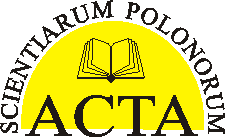Title
Does priming promote germination and early stand establishment of French marigold (Tagetes patula L.) seeds by inducing physiological and biochemical changes?
Autor
Kashif Mukhtar, Irfan Afzal, Muhammad Qasim, Shahzad Maqsood Ahmad Basra, Muhammad Shahid
Keywords
Germination; priming; marigold; seedling vigour; stand establishment
Abstract
Poor plant stand establishment is a common problem for marigold production. Exposure to seed priming is one of the strategies being used to accelerate the activation of plant growth, especially seed germination in many crops. Therefore, an experiment was conducted to investigate the influence of different seed priming techniques on performance of French marigold. For this purpose, different seed priming techniques: hydroprimng, 50 mM CaCl2, 100 mg L-1 salicylic acid and 100 mg L-1 ascorbic acid were assessed. Seeds without any treatment were considered as control. Priming with 50 mM CaCl2 was proved to be the most effective treatment in enhancing germination and seedling vigour among all other treatments including control as shown by higher final germination/emergence, germination energy and lower mean germination/emergence time. Furthermore, positive correlation between reducing sugars and dry weight and α-amylase activity and the concentration of reducing sugars indicates that enhancement due to priming could be attributed to higher reducing and total sugars as well as higher α-amylase activity in primed seeds.
Pages
13-21
Cite
Mukhtar, K., Afzal, I., Qasim, M., Basra, S., Shahid, M. (2013). Does priming promote germination and early stand establishment of French marigold (Tagetes patula L.) seeds by inducing physiological and biochemical changes?. Acta Sci. Pol. Hortorum Cultus, 12(3), 13-21.
Full text


